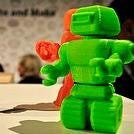A simple card game to explore the potential of Open Data
What is this game for?
A quick game for open data advocates, workshops organisers and designers. The aim is to make it easier for users to discuss and explore data, and generally to get people more excited about the potential of open data. The game can be played during workshops, hackdays and co-design activities.
Credit for this concept goes to Jag Goroya who developed it during his open data workshops and then generously invited others to experiment with it Open Data Camp. Also thanks to FutureGov for letting me test the game during our events.
Find below screen-shots, guidelines and the files to create your own card deck…
What problem is this game trying to solve?
- Let’s face it, most people won’t open a spreadsheet unless they have to. Even as more and more people get trained in data literacy, there is still a need for the wider public to engage with the untapped potential of this newly available resource. For this we need discovery tools and activities that are fun and easy to work with
2. Designers are not trained to work with data. Designers often say that data feels too abstract. Visualisation tools can help, but they require being pre-processing by someone who know what questions to ask the and has the right skills to use the tool.
For collaboration or co-design sessions, designers need an easy way to showcase, explore and combine the content of a dataset without opening the files.
Creating the card deck
This activity is based on 2 type of resources : Datasets from within the organisation you’re working with, and datasets from external sources (e.g Open Corporates, ONS data) which will bring great value when combined together. You can use the sample deck provided but I found easier to work with data that participants can easily relate to, so I recommend creating a customised deck.
- How many cards do you need? 3 per participant
- Cards categories: It’s easier to list datasets per category: property, finance, health, environment etc.
We first tested this activity with public servants so we used data opened as part of the Local Government Transparency Code, which generally includes a mix of financial, property, organisational and planning information. The strength of this game comes from data-combining, which enabled participants to see the potential of this data in a new light.
Game guidelines
Below is the template provided to groups. Players will place their 3 selected cards and write down “insights”.
- Reporting: Allow 2 minutes for each group to share their ideas
What happens next
- Open discussion: This game naturally creates an open discussion among participants about the data, the organisation, the users, and the potentials benefits of each “insight”.
- Hackday: If you are working directly with users (or using personas) to develop a prototype during a hackday, the discovery game could be a useful first step.
Depending on your event format, many more game variations are possible (e.g. a second round to refine the ideas and get specific questions for developers, work with a prepared scenario etc.).
I’m curious to hear what you will come up with…
What the users said about the activity
- Using physical cards makes it easier to understand potential data combinations
- More time is needed to explore the themes and write down insights
- I didn’t know I knew that much about the data
- I wasn’t sure how to use the template, it would be useful to have instructions on the page
- It felt like having a discussion about real problems without being blocked by my lack of technical skills
Overall feedback has been positive, participants enjoyed being able to manipulate the cards (some traded with other tables) and all ended up communicating in simple ways about data. When run with local councils, it helped develop useful conversations about the organisation: How data is created, maintained and how services could work together to improve them.
There were lots of insights and ideas collected… more on them in a future post.
Next development steps:
- Improve the deck and template designs based on user feedback
- Card generator: After more iterations we could develop a deck generator that would automatically import headers from any dataset and generate a deck
- For the fancy decks, why not try printing them on new business cards that have embedded NFC chips that you can configure to do the digital action of your choice?
More data games
- School of Data is working on a data visualisation game that provides players with scenarios to follow (currently only with a closed license)
- If you’re into actual card games, check out Open Trumps. It’s a version of the popular card game Top Trumps based on open datasets from the UN and the World Bank. It includes a deck generator software.
- And of course the ODI crew is developing the promising Open Data Board Game Project
Now it’s your turn: you can either download the sample deck below or create your own. Do share your comments and decks. I’m specially interested in hearing from designers and hope they will apply their thinking to improve the game.
Download the files
You can find all the files on Github. Logo created by Roxana Bacian
